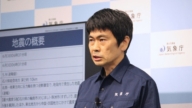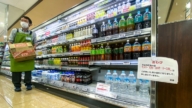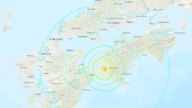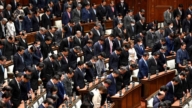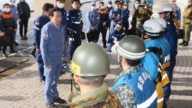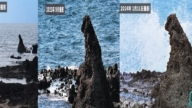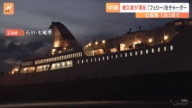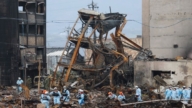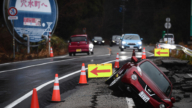【新唐人2011年3月17日讯】这两天,大陆网上热传中共中宣部的一份内部文件,说的是禁止国内媒体把云南地震跟日本地震做对比。中国近几年来地震频繁,那么对比观察一下, 中宣部为什么要禁止呢? 有什么不可告人的秘密吗?有网友表示:“不是日本太好,而是大陆“政府”做得太差!”
在日本发生地震,海啸之后,首相菅直人多次出现在媒体面前,每次都是直接通报灾情,包括说明核泄漏的严重危机。除了坐直升飞机视察以外,他没有亲身赶赴灾区。但是,菅直人调集了10万自卫队员出发救援,然后又在全日本征集了6万退役的自卫队员,增加救难支援。
三年前,2008年中国汶川地震发生后,中共总理温家宝赶往灾区。在地震现场,他大发脾气也不能即时调动中国军队的一兵一卒。相反,负责保卫他的大批公安,使灾民们得到的不是食物和安慰,而是人身自由被限制。
有大陆网友观察日本地震反讽说,“为何没见到领导人争先恐后赴灾区视察?没见到政府“官员”对着压在建筑物下的人喊,你们给我挺住?没见到“媒体”镜头访问遇难者家属,能幸存下来最应该感谢谁?”
一篇题为“中国人感慨日本地震灾后三大怪现象”的博文,被中国互联网大量转载,其中作者表示,由于职业习惯,他每天不间断关注日本灾情新闻,发现了三个“怪”现象。
其中的一个“怪”像就是,“日本媒体为啥很少报导官员救灾的新闻?”“为什么不报导政府和官员在大灾面前发挥作用?”
另外的“怪”现象,作者描述,日本首相菅直人简直就是“新闻发言人”,他没有说多少安慰民心的话,反而告诉人民现在情况很“严重”。
这位作者还写了日本新闻“太透明”的“怪”现象,他表示,报导“几乎是在实录、写实。没有忌讳,没有回避,没有遮掩。”比如核电站爆炸、核辐射威胁灾民的新闻内容,全都报导,作者以反讽的手法写道,“难道不怕有些新闻报导出来会出现“民心不稳”吗?”
作者说,“他们报导中没有‘秩序井然’,‘供应充足’之类的话语”,而是如实的报导了“日本三得利公司立即宣布所有贩售机免费供应”;“日本的7-11全部免费提供食品”;“大超市开放避难”等等具体的实例。
再来看看日本发生灾变之后,第一时间开放世界各国的救援团队,日本官方公开表示经历大海啸后,人们能生存的可能性很小,希望外国援助首先应该提供担架,帐篷等救援物资。现在多国救援物资和人员早已经到达日本。
但是在汶川地震当时,中共使用各种托辞拒绝外援,导致来自日本的第一支救援队伍在震后三天才到达中国,错过了地震救援的72小时黄金时间,在接下来的几天里,只能从废墟中挖出多具遇难者的遗体。甚至还有外国救援团队,在地震后 9天才被允许进入现场。
新唐人记者赵心知、萧宇综合报导。
Who Will They Thank for Their Lives?
China’s websites circulate an internal document
from the CCP’s Propaganda Department, banning
comparison of earthquakes in Japan and China.
Why does the CCP not allow the comparison?
A netizen said: “It’s not that Japan is doing too well,
but that the CCP is doing too badly.”
After the earthquake and tsunami in Japan,
Prime Minister Naoto Kan appeared often in media,
reporting on the state of disaster, including
nuclear leaks. He observes the disaster from
jet planes and on the ground.
He sent in 100,000 troops, and 60,000 veterans
from the Defense Force to assist in disaster relief.
In 2008, during China’s Wenchuan earthquake,
Premier Wen Jiabao also visited the disaster area.
On the site, he lost his temper while trying
to get the army to help. Public security
did not bring food, nor console the people,
but it did restrain their freedom.
Now netizens comment on Japan:
“Why didn’t their leaders all go to the disaster zone,
shouting at those crushed under debris to hang on?
Why the TV cameras pointed at the survivors
did not ask them who will they thank for their lives?”
A blog entitled “Three Oddities” Became
very poplular in China, because the author
provided frequent updates on the disasters in Japan.
The first oddity: Japanese media rarely reports
on government officials’ role in disaster relief.
Why they do not emphasize
the role of the government and the officials?
The second oddity: Japanese Prime Minister
Naoto Kan acts like a ’media spokesperson,’
telling people about the disaster situation.
The third oddity: Japanese media transparency.
The blog commented, “Their media writes about
the actual reality, without cover-ups.
They report on nuclear leaks and their threats.”
The blog then commented, sarcastically,
“Aren’t they afraid such news will cause instability?”
The blog said the Japanese reports were not filled
with words like “all is orderly” and “plentiful supply.”
They reported truthfully.
Suntory Company will offer free drinks,
7-11 stores will offer free food,
and the supermarket will provide shelters.
Immediatly after the disaster,
Japan asked for international aid. This was
the first time there was a world rescue team
Official statement said shelters will be limited,
and asked other countries to provide
stretchers and tents.
Foreign rescue aids arrived in Japan quickly.
In comparison, during China’s Wenchuan quake,
the CCP used all excuses to refuse foreign aid.
The first foreign rescue team, from Japan,
arrived three days later, missing
the golden 72 hours. In the next few days,
the Japanese team could only retrieve
dead bodies from the debris. Nine days later,
foreign teams were allowed
to enter the disaster rescue zone.
NTD Reporters Zhao Xinzhi and Xiao Yu


